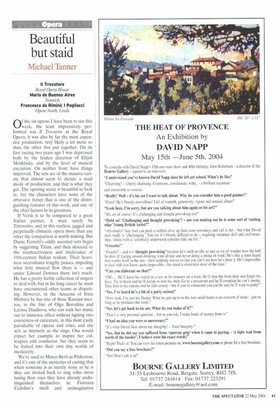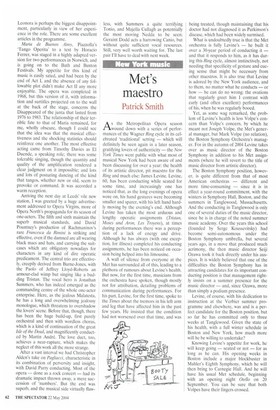Beautiful but staid
Michael Tanner
II Trovatore Royal Opera House Maria de Buenos Aires Norwich Francesca da Rimini; I Pagliacci Opera North, Leeds ry the six operas I have been to see this L./week, the least impressively performed was II Trovatore at the Royal Opera; it was also by far the most expensive production, very likely a lot more so than the other five put together. On its first outing two years ago I was depressed both by the leaden direction of Elijah Moshinsky, and by the level of musical execution. On neither front have things improved. The sets are of the massive variety that almost seem to dictate a staid mode of production, and that is what they get. The opening scene is beautiful to look at. but the characters have none of the obsessive frenzy that is one of the distinguishing features of this work, and one of the chief factors in its greatness.
If Verdi is to be compared to a great Italian painter, it must surely be Tintoretto, and in this restless, jagged and perpetually climactic opera more than any other the comparison is worth making. But Dante Ferretti's oddly assorted sets begin by suggesting Titian, and then descend to the unattractiveness and irrelevance of 19th-century Italian realism. Their heaviness necessitates lengthy pauses, impeding what little musical flow there is — and under Edward Downes there isn't much. He has a pretty feeble collection of singers to deal with, but in his long career he must have encountered other teams as dispiriting. However, in the Azucena of IrMa Mishura he has one of those Russian mezzos, in the line of Olga Borodina and Larissa Diadkova, who can sock her music out to immense effect without lapsing into coarseness or caricature, in this most easily parodiable of operas and roles, and she acts as intensely as she sings. One would expect her example to inspire her colleagues and conductor, but they seem to be locked into their own tiny worlds of mediocrity.
We're used to Marco Berti as Pinkerton, and it's one of the mysteries of casting that when someone is as merely noisy as he is they are invited back to sing roles more taxing than ones they have already undistinguished themselves in. Fiorenza Cedolins's shrill and unimaginative Leonora is perhaps the biggest disappointment, particularly in view of her experience in the role. There are some excellent articles in the programme.
Maria de Buenos Aires, Piazzolla's 'Tango Operita' to a text by Horacio Ferrer, was staged in a highly adapted version for two performances in Norwich, and is going on to the Bath and Buxton Festivals. My appetite for this kind of music is easily sated, and had been by the end of Act I, and the absence of any followable plot didn't make Act II any more enjoyable. The opera was completed in 1968, but this version of it, with information and surtitles projected on to the wall at the back of the stage, concerns the Disappeared of the junta that lasted from 1976 to 1983. The relationship of their terrible fate to that of Maria remained, for me, wholly obscure, though I could see that the idea was that the musical effectiveness and the shocking statistics should reinforce one another. The most effective acting came from Timothy Davies as El Duende, a speaking role; there was some tolerable singing, though the quantity and quality of the amplification rendered a clear judgment on it impossible; and lots and lots of posturing dancing of the kind that tangos, whether new or old, seem to provoke or command. It was accorded a warm reception.
Arriving the next day at Leeds' vile new station, I was greeted by a huge advertisement addressed to Opera Virgins, more of Opera North's propaganda for its season of one-acters. The fifth and sixth maintain the superb musical standards, and David Pountney's production of Rachmaninov's rare Francesca da Rimini is striking and effective, even if the damned are all wearing black macs and hats, and carrying the suitcases which are obligatory nowadays for characters in any kind of dire operatic predicament. The central trio are effectively, creepily derived from Burne-Jones, with the Paolo of Jeffrey Lloyd-Roberts an armour-clad wimp but singing like a budding Tristan. The vocal hero is Jonathan Summers, who has indeed emerged as the commanding centre of the whole one-acter enterprise. Here, as the jealous Malatesta, he has a long and overwhelming jealousy monologue, which threatens to overshadow the lovers' scene. Before that, though, there has been the huge build-up, first purely orchestral and then with wordless chorus, which is a kind of continuation of the great Isle of the Dead, and magnificently conducted by Martin Andre. The love duet, too, achieves a near-rapture, which makes the neglect of this work all the more strange.
After a vast interval we had Christopher Alden's take on Pagliacci, characteristic in its combination of perversity and insight, with David Parry conducting. Most of the opera — done as a rock concert — had its dramatic impact thrown away, a mere succession of 'numbers'. But the end was superb, and the musical side virtually flaw
less, with Summers a quite terrifying Tonio, and Majella Cullagh as potentially the most moving Nedda to be seen; Geraint Dodd acts a harrowing Canio, but without quite sufficient vocal resources. Still, very well worth waiting for. The last pair I'll have to deal with next week.



















































































 Previous page
Previous page